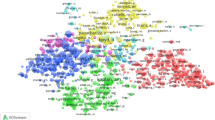Abstract
The objective of this work is to analyse technology and social relationships using the concept of knowledge. Therefore technology is not only a means to produce and social relationships a means to interact, but also the result of a whole of elements. The concept of knowledge aims to analyse these elements both from a structural point of view, highlighting their characteristics, and from a dynamic point of view, which considers how subjects interpret and make sense of them. In this framework technologies and social relationships are reinterpreted according to knowledge that characterises each context, suggesting some clues to design technologies, information technologies and social policies.
Similar content being viewed by others
References
Berger, P. and Luckmann, T. (1966). The Social Construction of Reality. Doubleday, Garden City, NY.
Boisot, M. (1995). Information Space: A Framework for Learning in Organisations, Institutions and Culture. Routledge, New York.
Ciborra, C. (1993). Teams, Markets and Systems. Cambridge University Press, Cambridge, UK.
Ciborra, C. (1996). Introduction in C.U. In Ciborra, C. (ed.)Groupware and Teamwork. Wiley, Chichester, UK.
Ciborra, C., Patriotta, G. and Erlicher, L. (1995). Disassembling Frames on the Assembly Line: The Theory and Practice of the New Division of Learning in Advanced Manufacturing. In Orlikowski, W., Walsham, G., Jones, M. and DeGross, J. (eds)Information Technology and Changes in Organizational Work. Chapman & Hall, London.
Donati, P. (1996). Teoria relazionale della societá. Franco Angeli, Milan.
Flichy, P. (1995). L'innovation Technique. La Decouverte, Paris.
Hayek, F.A. (1945). The use of knowledge in society,American Economic Review. September. 519–530.
Heidegger, M. (1962). Being and Time. Harper & Row, New York.
Heidegger, M. (1977). The Question Concerning Technology and Other Essays. Harper & Row, New York.
Husserl, E. (1970). Logical Investigations. Routledge, London.
Kuhn, T. (1962). The Structure of Scientific Revolution. University of Chicago Press, Chicago.
Latour, B. (1995). Social Theory and The Study of Computerised Work Sites. In Orlikowski, W., Walsham, G., Jones, M. and DeGross, J. (eds)Information Technology and Changes in Organizational Work. Chapman & Hall, London.
Marradi, A. Problemi e Strumenti della conoscenza, Material used during the academic year 1994/1995 at the University of Bologna.
Redding, S.G. (1993). The Spirit of Chinese Capitalism. De Gruyter, Berlin.
Silin, E.H. (1976). Leadership and Values: The Organization of Large Scale Taiwanese Enterprises, Harvard University Press, Cambridge MA.
Weber, M. (1951). The Religion of China. Free Press, Glencoe, IL.
Weber, M. (1964). The Theory of Social and Economic Organization. Free Press, New York.
Williamson, O.E. (1975). Markets and Hierarchies: Analysis and Antitrust Implication. Free Press, New York.
Author information
Authors and Affiliations
Additional information
c/o International House, post n. 454, 199-1 Dong Soong-dong, Chongro-ku, Seoul, South Korea, 110-510.
Rights and permissions
About this article
Cite this article
Resca, A. Technology and social relationships as knowledge elements: An insight into the institutional and non-institutional relationships. AI & Soc 13, 263–281 (1999). https://doi.org/10.1007/BF01174781
Issue Date:
DOI: https://doi.org/10.1007/BF01174781




